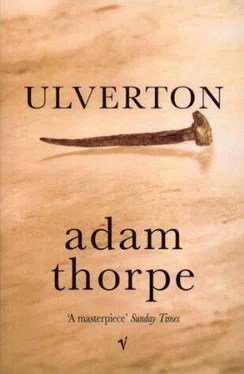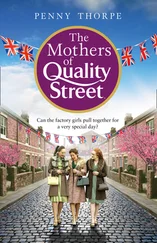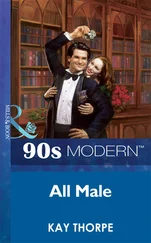One time we gets some work up at the Hall, an not jus the back-stairs, neither. Ladybitch Chalmers wanted her broke bits mended, didn’t she? I got a peepful of her stuff, I did. All gilded an carved like it were breathed out an no iron hadn’t ever touched it, all leaves an twined in bedwine an ivery door had a-chitted some ivy atop. Smell o’ wax, though I don’t go along wi’ polishin as the fine ones do. Hands on the rails do it, an the boards gets greasy an slippy. They likes the shine, see. Anyways, I gets a bit of a pier-glass, a banger of a glass, twice the size of I, an there was a bit of a wing nicked off a what-d’ye-call, a cupid. I carved this wing out like my life hanged on it, an were right proud at it, all the same, an tapped it on wi’ a fillet aback to keep it from topplin off an upsettin her ladyship, though she weren’t lackin in cupids, was she, the way she goed on? — an in comes Abraham, an squints at it, an sucks his teeth, an shoves his hands in his britches, an stands straddle-wise, an hums an hahs, an says, ‘Samuel, that ben’t a wing for a cupid so much as a hawk.’ An I says, ‘Nay, Mr Webb, not so much a hawk, more a lark.’ An he smiles, an says, ‘Samuel, best take her down. Thee have got to be handlin on her like thee be smitten.’ Wood was allus ‘her’ to Abraham.
An I did. Still there, I shouldn’t wonder. Though they don’t deserve it. I’ll tell thee on that some other time. She were a crabby old bitch, Lady Chalmers. I seed her picture, from way back, an she were handsome then. Though she still thought she were, the way she beautified herself wi’ all that white stuff, an all them red ribbons in her hair. She were not much better nor her son, I’ll say that, an that be all but swearin, round here. We don’t forget easy. Recallin don’t get ramshackle, not round here. No.
See that chap come in now? You ax him about the Chalmers. Atween you an I, he have bagged more deer nor they have. That be his sister wi’n, old Mags Knapp. She was allus broken-mouthed. Lost her teeth ploughin, we say. Green Man reglars, don’t know what they be doin in the Never Fear. As you knows as the New Inn, though it en’t bin new for a tarnal long time. Had a drop aready. Maybe the law be on ’em. That’ll be summat. There en’t a mother’s son in here as hasn’t tried to get what be theirs by right, off o’ them Chalmers. Don’t tell narn. You be ridin through. Nowt o’ yourn, sir.
No.
What Abraham ud allus say to me: ‘Thee be adrift, Samuel, an if thee don’t get hammerin, thee’ll sink.’ He was full o’ them concoctions, was Abraham. But he were right. My work allus had a weakness about it. Not a big ’un. Jus a kind o’ touch about it, that it weren’t solid, like his were, all the way from start to finish. It’d start strong, but ud be gnarley, or bungersome, an then strong, an so on. Jus a touch.
Ah well.
Can’t all be masters. No.
He could spot a tree as were ready better nor arn other. That was what he had. Dead o’ winter, frost cracklin, sap down, first light up in the copses — Baylee mainly, good oak there, middlin tough acause the soil en’t thin, an Smithy Copse for elm, an top o’ Frum Down for beech, though they’ve mostly gone now, them as were past Five Elms Farm, on account o’ the storms, for they don’t root deep, beech, an they were right on brow there, afore sarsens, though there be a fine clump on the estate, agin river, where they put that daft temple, aye, an wych astraddle the river ater Quabb Bottom jus afore old Master Pottinger’s mill, goin up, in Grigg’s, for we needed a goodish lot o’ wych, for the furniture, though I prefers the Dutch, plenty o’ that out Bursop way, an roundabouts, Dutch bein easy on the palm an works wi’ you, don’t it? — an there he’d be, deep in Baylee, eyein this butt, that butt, an allus better nor his bro for seein the wheel in the crooked uns, ezackerly right, an ud mark ’em, I can see him now, wi’ a flick o’ the gouge an stride through the old mist, cracklin over the floor — an he’d be fellin the next day, he’d be that quick at hagglin.
They’d crash down all right. He’d have the butts in the bob in no time, up there in the woods. You go to the yard now, see the elm stacked, right hand o’ saw-pit, we cut down eight, nine year ago, when we were still gristy. That be my work there, though I won’t never fashion it. Could tell you where ivery one of ’em stood, once. All out Bursop way. Ivery one have a tale in her. Like haaf as be fashioned out o’ timber in Ulver, I can tell you where it come from, what dern tree. See that old door there? Twenty year old, but it were once up atop Basing’s Down, north end o’ Swilly Copse, pleasurin its leaves in grawin weather, rustlin in wind. Afore we lopped she, an one day’s work got a door out.
Aye. He were more nor sixty then, but he were dashin about like a fox, up there in them copses, wi’ his big brown hat an big brown coat. I medn’t be able to book-larn, an know letters, but I can read them copses. ’Tis what he gived I.
You ride up to Baylee Copse an see. Other side o’ the square here there be Bew’s Lane. Go on up there, see, an onto the track an there be Baylee dead ahead. Dead ahead. Best oak round-abouts. Best English oak, save the top end, where the ground be chocky. Wood comes hard out o’ that end. Stayin long, then?
Aye. I will. Good an warm.
Aye. It all helps. Kills the worm, don’t it, like milk, milk in a milk pail. Them worms fancies chestnut, acause it be white an soft for them little jaws, but they don’t like the saturation. That be why the ale be good for thee. Kills the worm.
A good un, but true, if you’ll stay for it.
What the rooms be like up there then? Make sure she lays you a fire now. The chill en’t out yet. Make sure. That there well side be best. Gets the sun, an not them dingin bells. You a churcher, then? Last time I bin was to lay down my old woman in her tarnal rest, God bless her. Go in there, look at the poppy-heads on the north side. That be my work. Abraham’s on the south. You’ll know. Never could do as he did. Never could. An the font-lid. That be ourn. I remimbers the tree, up in Baylee. Abraham, he stalks about one mornin, dead o’ winter, raw it was, clouds all curdlin, an he were right riled, acause he wanted an oak for the lid that were droxy at the bottom, for the beauty on it, an he couldn’t spot un, or more like smell un, an were gettin more an more glowery, till he stopped stock-still anigh a gurt mellow butt, big as a church, an sniffed low, an were pleased as punch, an that be the one. That be atop the font. Nice an streaky, like river-spate ater storms. Two years afore he worked it, mind. Vicar had to wait, didn’t he? An Abraham were that vallyble, he did. Atween you an I, though, I can spot a dragon in them patterns. I reckons as how there were a dragon in that tree. He’ll avenge hisself one day. ’Tis what oak be. Vengeful. Eh? Heh.
I gets a-dry talkin.
Aye.
It were my hands. Dubby they be, see? Not made for handlin. Not for fine work. Not even afore rheumatics. Though I won’t say as I did poor work. But it weren’t never admired.
Look. Lay hold o’ this here, look. Lay hold o’ the haft.
Worked wi’n for nigh on forty year, didn’t I? Chiselled my life out, wi’ that. Chiselled my life out. Sold the other tools. Couldn’t rid me o’ that un. Don’t sit comfortable in a fine hand. Look. My life in this here haft, see? All worn one side. A pokey kind o’ life. But I couldn’t rid me o’ this. My life in this haft. Nigh worn out.
First job, wi’ this un, morticin for the winders in the Vicar’s house. Still there, praise the Lord. Them winders have seed a thing or two, I shouldn’t wonder. Haven’t stuck since, though. Not to my knowledge. That be Webb’s work for you. That be Abraham.
Читать дальше










